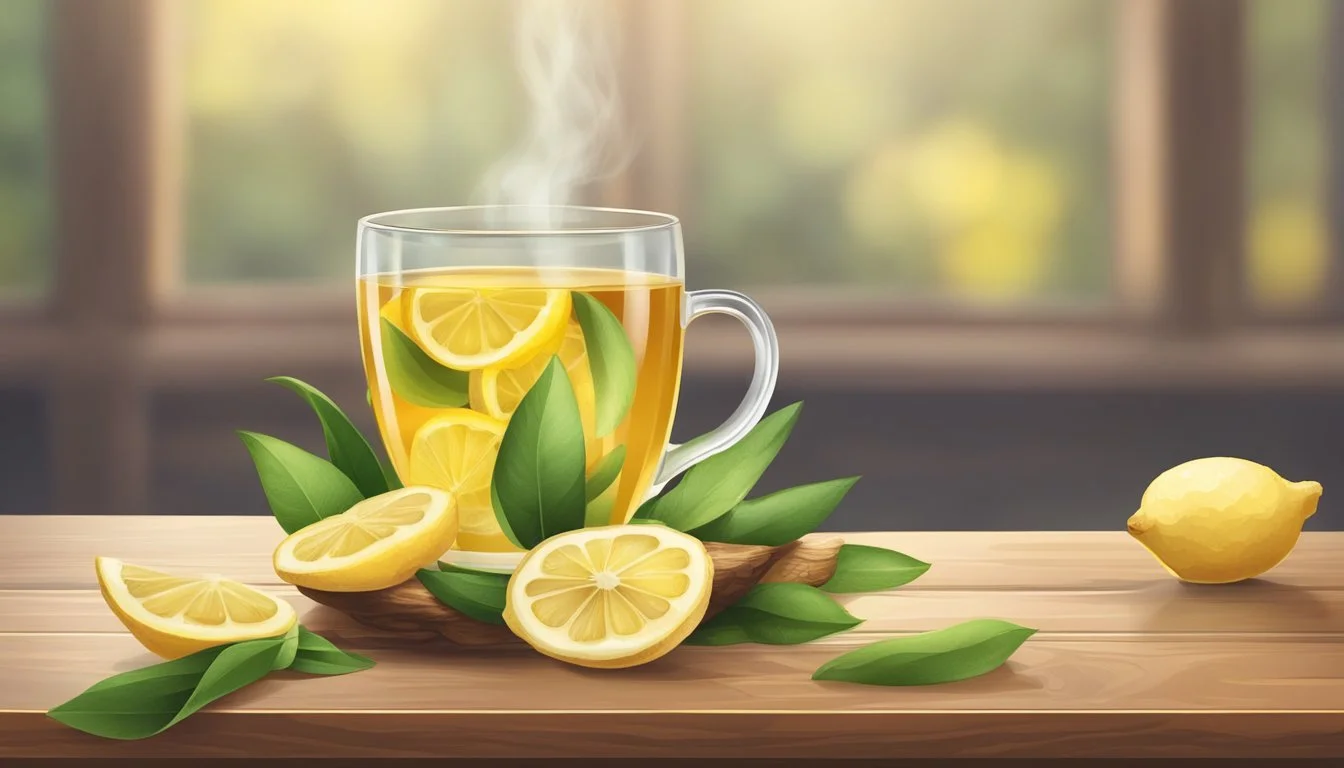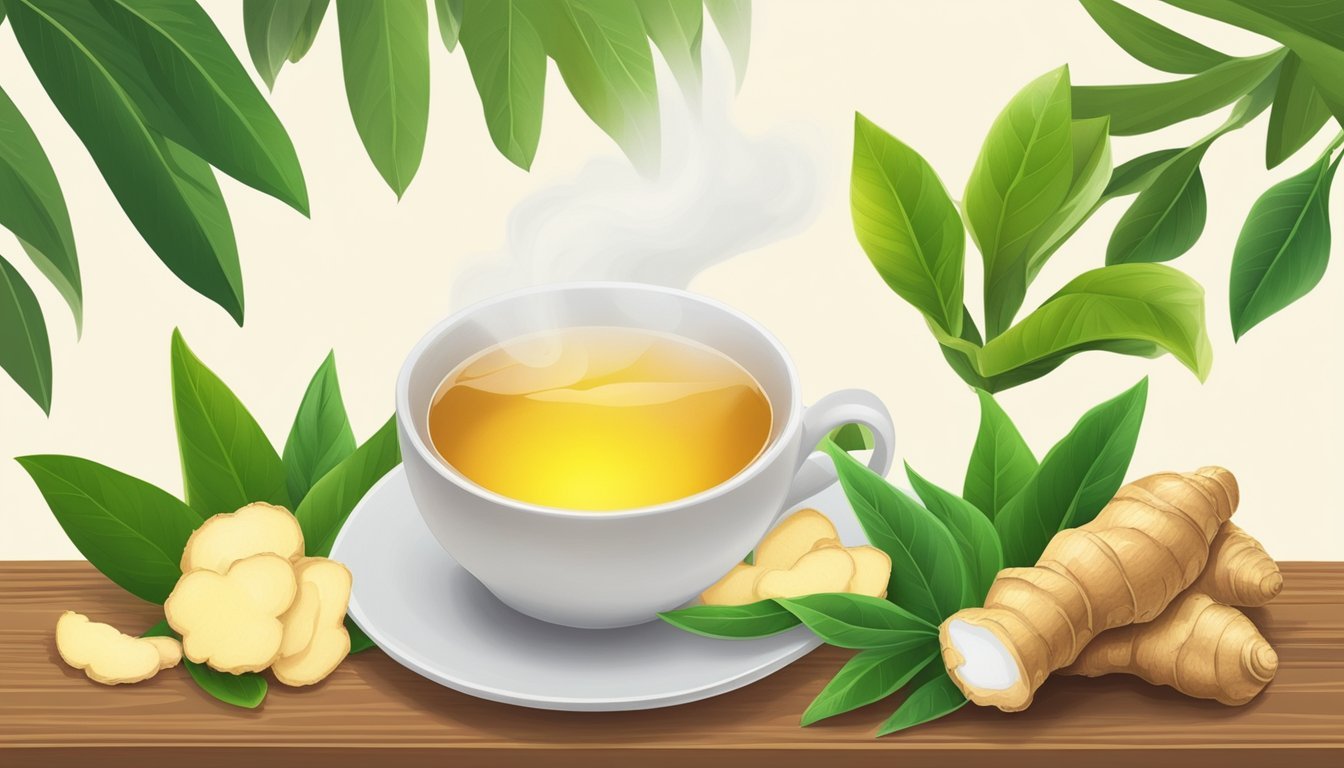Ginger Peel Tea
Discover Its Soothing and Anti-Inflammatory Benefits
Ginger, revered for its culinary and medicinal properties, has been utilized for centuries. Among its many uses, ginger stands out as a potent anti-inflammatory agent, thanks to its active constituent, gingerol. By incorporating ginger into a beverage, one can harness these properties to potentially reduce inflammation and promote wellness.
Peeling ginger often seems like a mundane task, with the peels regarded as nothing more than kitchen scraps. However, these peels contain significant amounts of gingerol and other beneficial compounds. Brewing a tea from ginger peels is an excellent method to make full use of the root's benefits.
The preparation of ginger peel tea is quite straightforward and is a sustainable practice that maximizes the use of the ginger root. This soothing tea not only helps in minimizing food waste but also delivers a beverage that may help alleviate inflammation and soothe the digestive system.
Exploring the Roots: Ginger and Turmeric
Ginger and turmeric have been heralded for their medicinal properties, particularly their anti-inflammatory and antioxidant capabilities. These roots offer a bounty of health benefits that have been recognized in traditional medicine and are increasingly supported by scientific research.
Origins and History
Ginger (Zingiber officinale), originating from Southeast Asia, has a rich history dating back over 5000 years. It was highly prized in ancient Rome and has been a common element in Chinese and Indian medicinal traditions. Turmeric (Curcuma longa), also native to Southeast Asia, has been used in India for at least 4000 years, both as a spice and a spiritual symbol.
Ginger Turmeric Ancient Rome Traditional Indian practices Southeast Asia origins Southeast Asia origins
Composition and Benefits
Ginger: At the heart of ginger's health benefits is gingerol, the main bioactive compound responsible for much of its medicinal properties. Gingerol has powerful anti-inflammatory and antioxidant effects.
Compound Properties Gingerol Anti-inflammatory, Antioxidant
Turmeric: The primary active component in turmeric is curcumin, which gives it not only its vibrant color but also its anti-inflammatory and antioxidant prowess. Notably, curcumin is linked to improved management of oxidative conditions and inflammatory diseases.
Both roots contain compounds that bolster the immune system and have been associated with potential anti-cancer properties. They are also rich in vitamin C, amplifying their health benefits. Regular consumption of ginger and turmeric can aid in maintaining a healthy immune system and mitigating various health issues related to oxidative stress and inflammation.
Roots Benefits Ginger & Turmeric Anti-inflammatory, Antioxidant, Immune system support, Potential anti-cancer properties
It is evident that these roots are more than just culinary ingredients; they are potent sources of natural health-promoting compounds.
Ginger Turmeric Tea Benefits
Ginger turmeric tea, known for its vibrant hue and robust flavor, offers myriad advantages for health, especially in the realms of digestion and anti-inflammatory properties. Scientific studies back ginger and turmeric as effective agents for various health issues, providing a natural alternative for those seeking wellness without over-reliance on pharmaceuticals.
Natural Relief for Digestion and Nausea
Ginger: A potent aid in relieving digestive maladies such as indigestion and upset stomach.
Turmeric: Complements ginger in easing digestive discomfort, while also being instrumental in mitigating nausea.
The dynamic duo in this tea work synergistically to provide comfort. They interact with digestive enzymes, supporting the gastro-intestinal tract and reducing discomfort associated with nausea and indigestion.
Impacts on Chronic Diseases
Cancer: Components in both ginger and turmeric may have properties that reduce the risk of certain cancers.
Heart Disease and Cholesterol: The tea's constituents can contribute to lower blood pressure and improved cholesterol levels.
Diabetes: Antioxidants present in this beverage help in managing blood sugar levels.
Arthritis: Its anti-inflammatory qualities target chronic inflammation, a perpetrator in arthritis pain.
Clinical research suggests these spices may possess chemopreventive and therapeutic properties that could slow down or prevent the progression of some chronic diseases.
Boosting the Immunity and Reducing Inflammation
Immune System: Regular consumption bolsters the body's immunity.
Inflammation: Ginger and turmeric are renowned for their anti-inflammatory compounds, offering pain relief to those with chronic inflammation.
Integrating ginger turmeric tea into a daily regimen can be instrumental in strengthening the immune defenses while concurrently tackling inflammation at its root.
Culinary Aspects: Crafting Your Own Ginger Peel Tea
Making ginger peel tea involves selecting the freshest ingredients and following a simple, step-by-step recipe. The process accentuates the natural flavors and health benefits of ginger and turmeric.
Selecting Quality Ingredients
Fresh Ginger: Look for firm, smooth-skinned ginger root. Organic roots ensure no pesticides interfere with health benefits.
Fresh Turmeric Root: Optional for added flavor and anti-inflammatory properties; also should be organic.
Natural Sweeteners: Honey or maple syrup can enhance flavor while keeping the tea natural.
Lemon Juice: Freshly squeezed to complement the ginger's zest.
The Step-by-Step Recipe Guide
Prepare the Ingredients:
Wash and dry the fresh ginger and turmeric roots.
Using the edge of a spoon, gently peel the ginger and turmeric, retaining the peels for their concentrated nutrients.
Slice or grate the peeled roots, based on preference.
Brew the Tea:
Boil water and prepare a teapot with a strainer ready.
Place the sliced or grated ginger, as well as the turmeric if using, into the strainer.
For an extra kick, add a teaspoon of grated ginger or turmeric directly into the pot.
Steeping:
Pour boiling water over the ingredients in the strainer, covering them entirely.
Allow the mixture to steep for at least 5 minutes or longer for a stronger infusion.
Additions and Serving:
Stir in lemon juice, honey, or maple syrup to taste.
Once the desired strength is reached, remove the strainer and serve the tea hot.
Customizing Your Tea Experience
Creating a personalized ginger peel tea experience is simple and satisfying. With a host of flavorful additions and dietary-friendly substitutions, anyone can tailor their cup to suit their taste and nutritional needs.
Additional Flavor Enhancements
Cinnamon: A stick of cinnamon warms up the brew, complementing the spicy kick of ginger.
Lemon Slices: Adding a few slices of lemon not only imparts a refreshing citrus note but also boosts the tea's vitamin C content.
Fresh Mint: A sprig of mint introduces a cool, soothing layer to the tea's profile.
Lavender: For a floral twist, dried lavender can be steeped along with the ginger, infusing the tea with a serene aroma.
Apple Cider: A splash of apple cider brings a sweet and tangy dimension that's especially welcome in autumnal blends.
Dietary Considerations and Substitutions
Vegan and Vegetarian: The base tea is plant-based, perfect for vegan and vegetarian diets.
Dairy-Free: For those avoiding dairy, ginger tea is naturally dairy-free, promising a comforting experience without concern.
Gluten-Free: With no grains involved, the tea is inherently gluten-free.
Water to Milk: While water is the standard solvent for tea, substituting with a favorite milk (almond, oat, soy) can create a creamier version.
Ginger Ale Alternative: For a cold variant, one can cool the tea and mix it with ginger ale, creating an effervescent, non-alcoholic punch.
Pairing and Serving Suggestions
Ginger peel tea stands well on its own as a soothing, anti-inflammatory beverage, but it also pairs beautifully with a variety of foods and can be varied in its preparation to suit different tastes and occasions.
Accompaniments and Variations
Accompaniments:
For a morning boost, one might consider pairing ginger peel tea with green tea, which provides a gentle caffeine kick.
When seeking a more robust flavor experience, adding a cinnamon stick or a twist of citrus can enhance the tea's natural zest.
Variations:
To derive a different health benefit, one could add a teaspoon of ginger powder to their tea. Alternatively, a ginger shot may serve as a strong, concentrated option.
Lemon ginger turmeric tea is another popular variation, combining the anti-inflammatory properties of all three components.
Presentation and Storage
Presentation:
Serving ginger peel tea in a clear glass can showcase its warm, inviting color. Using a spoon to remove any lingering pieces of peel or spice will ensure a smooth sipping experience.
For a touch of elegance, garnish with a thin slice of lemon or a small sprig of fresh herbs.
Storage:
If there's leftover tea, it can be stored in an airtight container in the fridge for 2-3 days. Ensure the container is sealed properly to maintain the tea's flavor and therapeutic properties.
To extend its shelf life, one can also freeze ginger peel tea in ice cube trays and thaw cubes as needed for a quick and easy refreshment.
Understanding the Impact of Preparation
The process of preparing ginger peel tea is crucial for maximizing its potential as a soothing, anti-inflammatory drink. Fresh ingredients and correct brewing techniques play a decisive role in enhancing the inherent health properties of the beverage.
The Importance of Freshness
Fresh ginger root is essential for the highest quality ginger tea. Fresh ginger ensures the presence of volatile oils and active compounds, such as gingerol, which contribute to the tea's anti-inflammatory and antioxidative effects. To prepare, one should:
Choose firm and smooth ginger roots.
Wash and scrub the peel thoroughly if planning to include it in the tea, as it also contains beneficial compounds.
Slice the ginger thinly to increase surface area, which aids in the infusion of flavors and nutrients.
Optimizing Health Benefits
Incorporating fresh lemon juice and combining ginger with other ingredients like turmeric can enhance the health benefits of ginger tea. For example, the addition of turmeric amplifies the anti-inflammatory potency, drawing out ginger turmeric tea benefits. A simple method to prepare this healthful beverage is:
Boil a cup of water.
Once boiled, switch off the heat and add sliced ginger and turmeric.
Cover and steep for about 5 minutes to avoid the escape of essential oils.
Adding a splash of fresh lemon juice not only complements the flavor but also adds a vitamin C boost.
By focusing on the freshness of the ingredients and carefully controlling the preparation process, one can create a warming ginger peel tea that maximizes the drink's inherent therapeutic qualities.
Health and Lifestyle
Ginger peel tea, with its soothing properties, has emerged as a beneficial beverage for health and lifestyle. It fosters weight management and digestive health while enhancing circulation and immunity, which are essential for maintaining a balanced lifestyle.
Weight Management and Digestive Health
Ginger peel tea aids in digestion, which can be a pivotal factor in weight management. The active compounds in ginger are known to stimulate the digestive system, enhancing the absorption of nutrients and the elimination of waste. Regular consumption can therefore assist those aiming for weight loss by promoting a more efficient digestive process. Additionally, ginger has properties that may help alleviate common digestive issues such as bloating and indigestion.
Enhancing Circulation and Immunity
The consumption of ginger peel tea encourages improved circulation. It is believed that ginger, being a natural vasodilator, helps expand blood vessels, promoting better blood flow throughout the body. This improvement in circulation is not only essential for oxygen and nutrient delivery to various organs but also supports the overall immune response. Furthermore, ginger's anti-inflammatory properties contribute to the strengthening of the immune system, helping to fend off illnesses and potentially reducing the incidence of vomiting linked with certain conditions.



